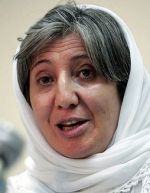Rights abuses continue unabated in Sudan: UN envoy
August 2,2007 (KHARTOUM ) — The special UN envoy on human rights in Sudan said on Thursday she had not seen any improvement since her last visit and complained of a lack of transparency by the Khartoum authorities.

Among the cases were those of senior officials from the two main opposition parties, Mubarak al-Fadil al-Mahdi of the Umma party and Democratic Unionist Party deputy chief Ali Mahmud Hassanain, who was arrested this week.
Samar stressed “transparency should be observed in those cases,” and that she was “worried about the detention of the opponents under the freedom-binding laws” which she said the government “has done little to amend.”
“Freedom of expression, political rights, freedom of associations are not being fully respected”, Samar said.
Samar also lamented the fact that a human rights commission has not been established in the north, as provided for in the peace agreement with southern Sudan, while such a body has been set up in the south.
The Rapporteur visited Juba in south Sudan and Al-Fasher, capital of North Darfur. Since her last mission to the war-torn Darfur region, “officials have now acknowledged that there is a problem” there, she said.
The UN’s Human Rights Committee (HRC) last month officially condemned “ethnic cleansing” in Darfur and sharply rebuked Khartoum for failing to prosecute militias involved in the killings.
It said in a report that “widespread and systematic serious human rights violations, including murder, rape, forced displacement and attacks against the civil population, have been and continue to be committed with total impunity throughout Sudan and particularly in Darfur”.
The Darfur conflict began in 2003 when an ethnic minority rose up against the Arab-dominated government in Khartoum, which then enlisted the Janjaweed militia group to help crush the rebellion.
According to UN estimates, at least 200,000 people have died from the combined effect of war and famine since the conflict started. Other sources give a much higher toll, but Khartoum disputes the figures.
(AFP)
